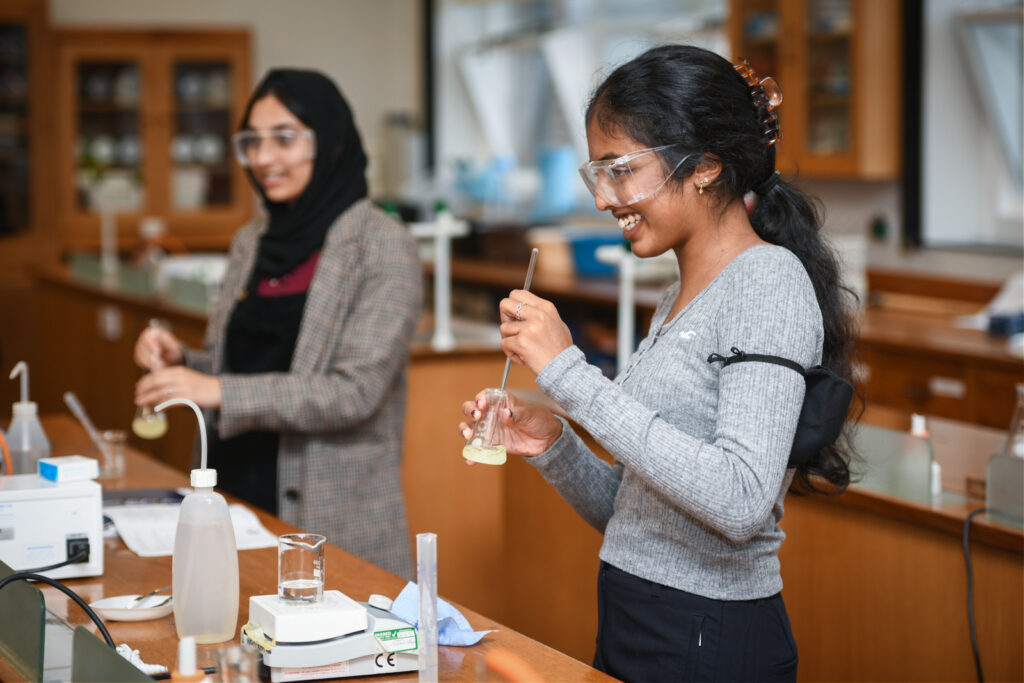Biology

Biology is amongst our most popular subjects, with most students taking the subject at GCSE, and it continues to be a popular choice at A Level too.
Biology is very much an experimental subject, and we have excellent laboratory facilities, enthusiastic, well-qualified teachers, and good technical support, enabling us to equip students with the essential practical skills required.
We aim to stimulate curiosity, interest and enjoyment in Biology and its methods of enquiry, thus encouraging a respect for and an understanding of living systems and the natural world. We seek to produce an understanding of the nature of scientific ideas and activity together with appreciation of the technological and environmental applications of Biology and the economic, ethical and social implications of these issues.
Students in Year 7 have the opportunity to use apparatus, e.g. microscopes, to get an experimental feel for the subject. The analysis of data is dealt with, including skills such as graph production and data logging. Human and plant reproduction are also covered.
In Year 8 the following topics are covered: gas exchange systems and breathing; the skeleton and muscles; inheritance; respiration; health; nutrition and digestion. In Year 9 we start AQA Biology GCSE where topics covered include: cell biology; organisation; infection and response.
GCSE Biology deals with living systems, enabling students to appreciate and evaluate major developments occurring in the real world from a position of knowledge. Topics ranging from stem cell research and genetic engineering, to the greenhouse effect and global warming profit by examination from a biological perspective. Biotechnology advances from vaccines to novel foodstuffs are having a profound effect on our lives.
The Society of Biology states ‘Many of the problems facing the world in the future, such as food supply, drug development and infectious disease, will be solved by Biologists’. The twenty-first century will need an informed general public as well as specialists. Biology is an essential basis for Medicine, Veterinary Science, Psychology, Dentistry and a whole range of Biological Sciences from Biochemistry and Molecular Biology to Environmental Science and Agriculture.
Studying GCSE biology offers students a range of advantages. They can develop a solid understanding of biology, including its processes and methods, and apply scientific inquiry to answer questions about the world.
Through practical work, students can enhance their observational, analytical, and problem-solving skills, while gaining the ability to critically evaluate biological claims. Topics such as cell biology, bioenergetics, and ecology are covered, preparing students for further academic pursuits and fostering a deep interest in the subject.
Biology is fundamentally an experimental subject. The AQA specification allows us to carry out a large number of practical activities and use the practical experiences to link theory to reality. In the first year of A Level Biology, students delve into topics such as biological molecules, cells, organisms’ exchange of substances with the environment, and genetic information, variation, and relationships between organisms. Additionally, students will be required to complete six practical activities.
In the second year, the curriculum expands to include subjects like energy transfers in and between organisms, organisms’ response to internal and external changes, genetics, populations, evolution, and ecosystems, as well as the control of gene expression. Students also engage in six compulsory practical activities during this period.
Future Careers
Beyond the classroom
There are many competitions and co-curricular clubs that students can take part in that are linked to Biology. Students can join the Junior Biology Club, Biology Extension Sessions for Sixth Form, or take part in the Biodiversity project which is led by a Sixth Form ambassador each year.
All students in Year 10 take part in the national Biology Challenge, and Sixth Form students are invited to take part in the Intermediate and Full Biology Olympiad. There are several Biology internal competitions, such as the annual photography and blog competitions.






